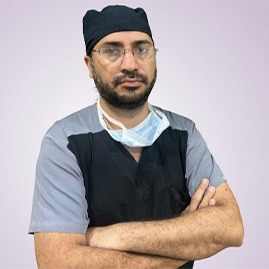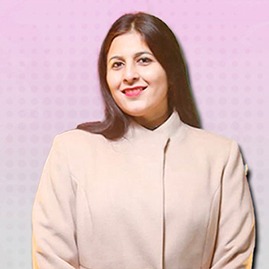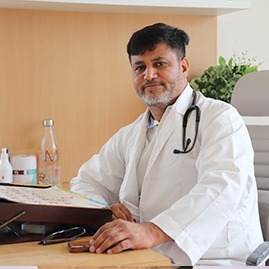
Shri Balaji Cancer & Multi-Speciality Hospital is bringing the region's best Onco Surgeon and oncologist under one roof, offering you the best Cancer care you deserve. You will get all Cancer Treatments by an experienced Onco Surgeon Dr. Ayush Makkar with thousands of successful cancer surgeries. And Radiation Oncology treatments from the area's most renowned oncologist Dr. Manjit Jaura, with over 16 years of experience, treating the roots of cancer with radiation oncology.
We will be also offering all dental treatments. Dr. Deepshikha Makkar will be heading the dental departments with over 10 years of expertise in all major dental treatments.
 About Us
About Us


Dr. Ayush Makkar has provided uncompromising and compassionate care to those affected with cancer.

Dr. Deepshikha Makkar (B.D.S. , S.M.S. Jaipur) is an experienced dentist practising from last 10 years.

Dr. Manjit Singh Jaura is Senior Oncologist, taking care of radiation oncology.






Two types of factors contribute to the cause of cancer. One is a tendency or predisposition to develop cancer. The other is exposure to the triggers that start it off. Examples are cigarettes, environmental toxins, sun exposure, or liver damage.
Why do some people get cancer and not others?In a few cancers such as retinoblastoma and in a small portion of the more common cancers such as a small proportion of breast and ovarian cancers there seems to be an inherited factor that researchers can partly identify. In most cancers, doctors assume that a person’s cells have a low threshold for becoming malignant. So that person will develop a cancer with relatively less prompting by a trigger such as cigarettes or the sun than another person whose cells have a higher threshold and who may be able to tolerate more exposure to a trigger without developing a cancer.
Stage I: This stage usually represents a small tumor or cancer that hasn’t grown deeply into nearby tissues. It’s sometimes called early-stage cancer.Stages II and III: Usually these stages represent larger cancers or tumors that have grown more deeply into nearby tissues. They also may have spread to lymph nodes. However, they haven’t spread to other organs or parts of the body.
Stage IV: Cancer in this stage has spread to other organs or parts of the body. It may be referred to as metastatic or advanced cancer.
Cancer can occur in any part of the body. They are usually painless and generally present as swellings or growths. They gradually increase in size and damage the surrounding tissue.
In a very small portion of special cases only. In certain jobs, prolonged exposure to a few chemicals may cause certain rare kinds of cancers. Nowadays almost all of these substances have been identified and are regulated.
Anyone can get cancer, although the risk goes up with age. Your individual risk depends on factors such as whether you smoke, lifestyle choices such as what you eat and how much you exercise, your family history of cancer, and factors in your workplace and environment.
Your body is made up of many different types of cells. Under normal conditions, cells grow, divide, become old, and die. Then, in most cases, they’re replaced by new cells. But sometimes cells mutate grow out of control, and form a mass, or tumor, instead of dying. Tumors can be benign (noncancerous) or malignant (cancerous). Cancerous tumors can attack and kill your body’s tissues. They can also spread to other parts of the body, causing new tumors to form there. This process is called metastasis and it represents cancer that has advanced to a late stage.
Yes, Cancer can be cured if detected early and treated promptly. Unfortunately in India, about 70% patients present in advanced stage diseases, which have poor chances of survival.